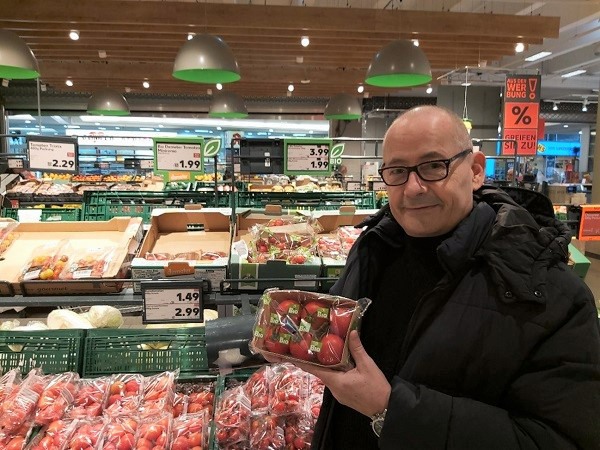The company Agribio Terra Organica is able to produce 70,000 tons of citrus fruit annually. The fruit comes from Spain, South Africa and Chile, among other countries. Oliver Huesmann of Fruit Consulting tells us how the German offshoot of the Agribio Deutschland Ltd, for which Huesmann is responsible, recorded a slight downward curve in organic consumption last year. "In the German market, Spanish produce showed particularly strong growth during the pandemic, but that fell away again due the effects of the war in Ukraine."

Oliver Huesmann. Photo by Fruitconsulting Ltd
Year-round supply of organic citrus fruit
Agribio now plans to offer organic citrus all year round with its presence in Düsseldorf, even hoping to increase its supply volume this year. "Larger quantities of organic produce are being imported again, in particular during the summer season; Chile and South Africa have increased their production. The main markets so far have included food retailers in France, Spain, Belgium and the Netherlands, although the company is now also turning its attention more to the DACH region," Huesmann says. "Agribio has its entire supply chain under control and, in addition to regular suppliers, also enters into production itself in the countries of origin. They take the supplier law seriously and constantly check the supply chain in terms of human rights and social standards, as well as production processes, in order to be sustainable as a whole."
The company's production has not been affected by the severe drought in Spain, he said. "At times, at most, there have been minor quality issues or smaller calibers, but there has been enough water available to keep production going." Unlike the production of citrus, the main problems in Spain have been with the cultivation of products such as avocados and mangoes.
The presentation of the produce is shifting more toward the sale of loose produce. "The nets are biodegradable, but not 100 percent." Huesmann also points to Agriobio's carbon-neutral production of organic lemons: "Here, under the 'Climact' and 'Growing for Life' programs, CO2 emissions from the production of organic lemons are being offset. CO2 offsets for oranges and grapefruits are in the works as the next step."
Marketing complications
The market expert observes that higher environmental awareness as well as the trend toward vegan nutrition have additionally fueled the high interest in organic products in Germany. This is evident not least from the fact that discounters are now also focusing more on organic goods. "Of course, this has also pushed organic consumption again. Last year, however, showed a strong interruption of this, as consumers generally reached for cheaper goods due to cost explosions."
In order for organic specialty retailers to prove themselves more strongly in the future, they must also position themselves more broadly, Huesmann said. "Some businesses think regionally and try to buy regionally as well, which naturally makes the range of goods more limited. Also, because of the size of the companies, they sometimes lack the right logistics to cover greater demand."
Compared to discounters or other supermarket chains, pure organic retailers have fewer stores and are therefore logistically more difficult to supply. There is progress, he said, but not really at the moment. "There is a very large range of goods in the conventional sector that is offered so cheaply that organic goods have come under a lot of pressure. There are farms that have to sell some of their organic products as conventional." However, the depressed prices did not necessarily lead to an increase in purchases.
Lack of communication as the main problem
The fact that it is becoming increasingly difficult to market products today, and that it is almost impossible to find personnel, is a widespread and transnational problem. At the same time, many companies also lack appropriate communication, he said. "Fruit and vegetable producers have failed to maintain communication with consumers, thereby ensuring that their work is appreciated," says Huesmann. Better communication would also make it easier to explain price increases.
For more information:
Oliver Huesmann
Fruitconsulting ltd.
Düsseldorf
Tel: +49 (0)211 54691736
[email protected]
www.fruitconsulting.eu










